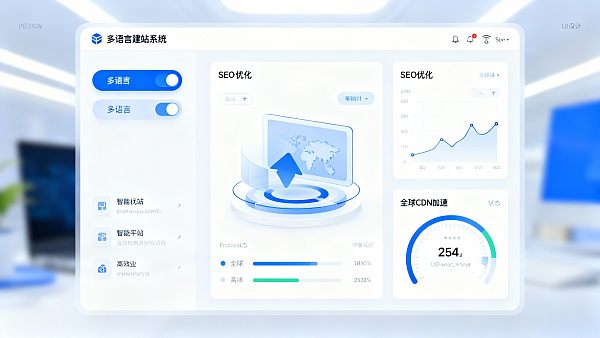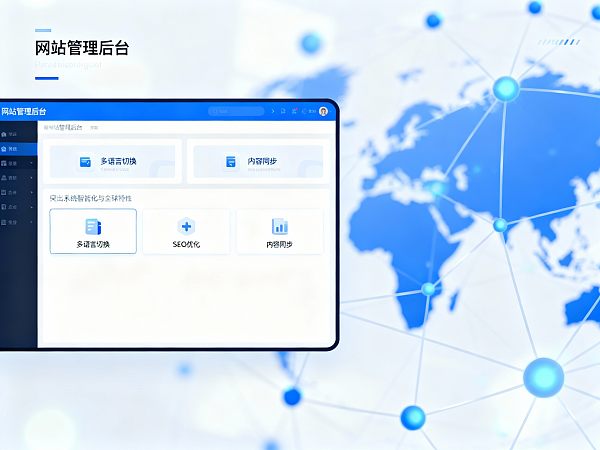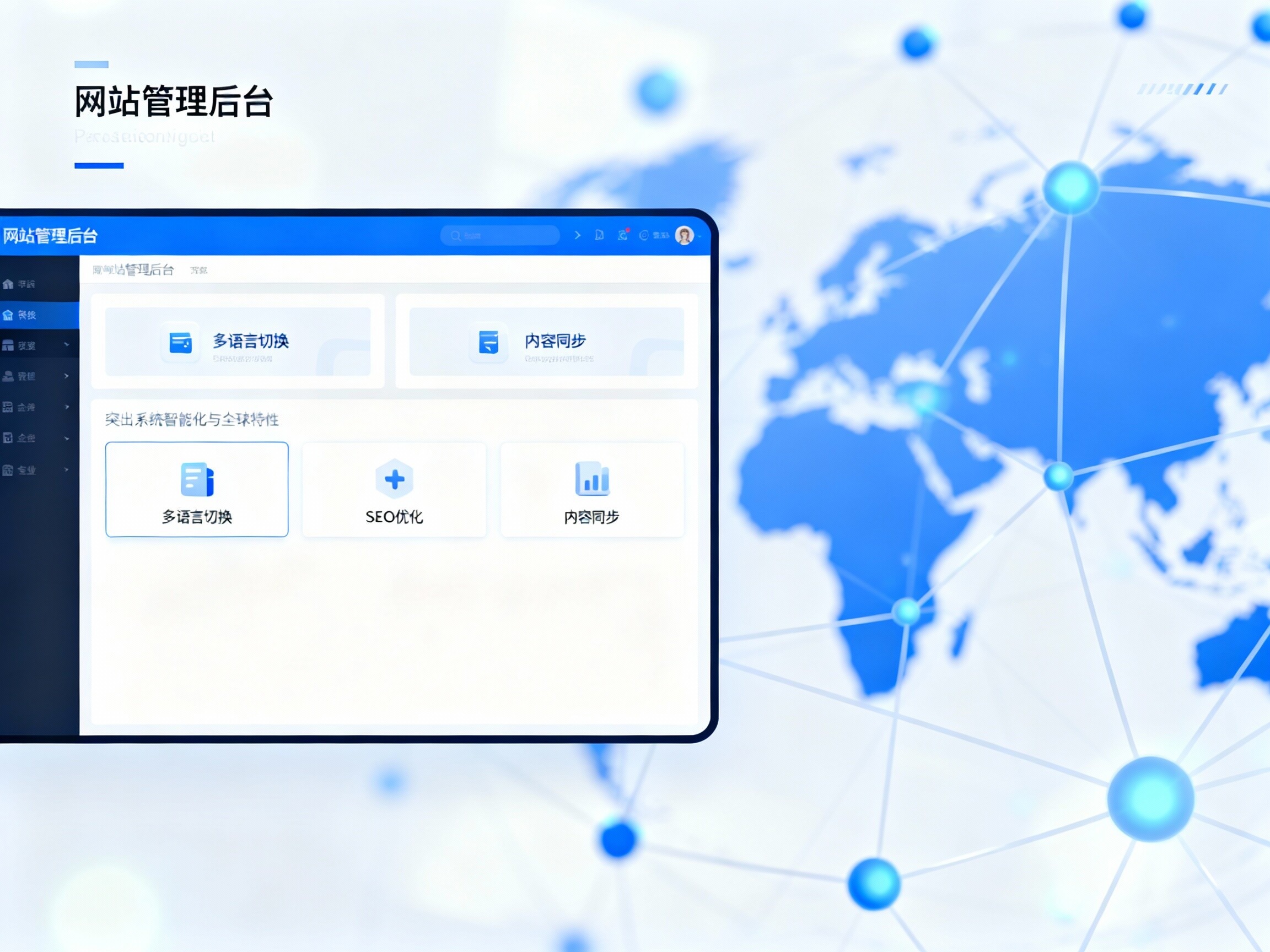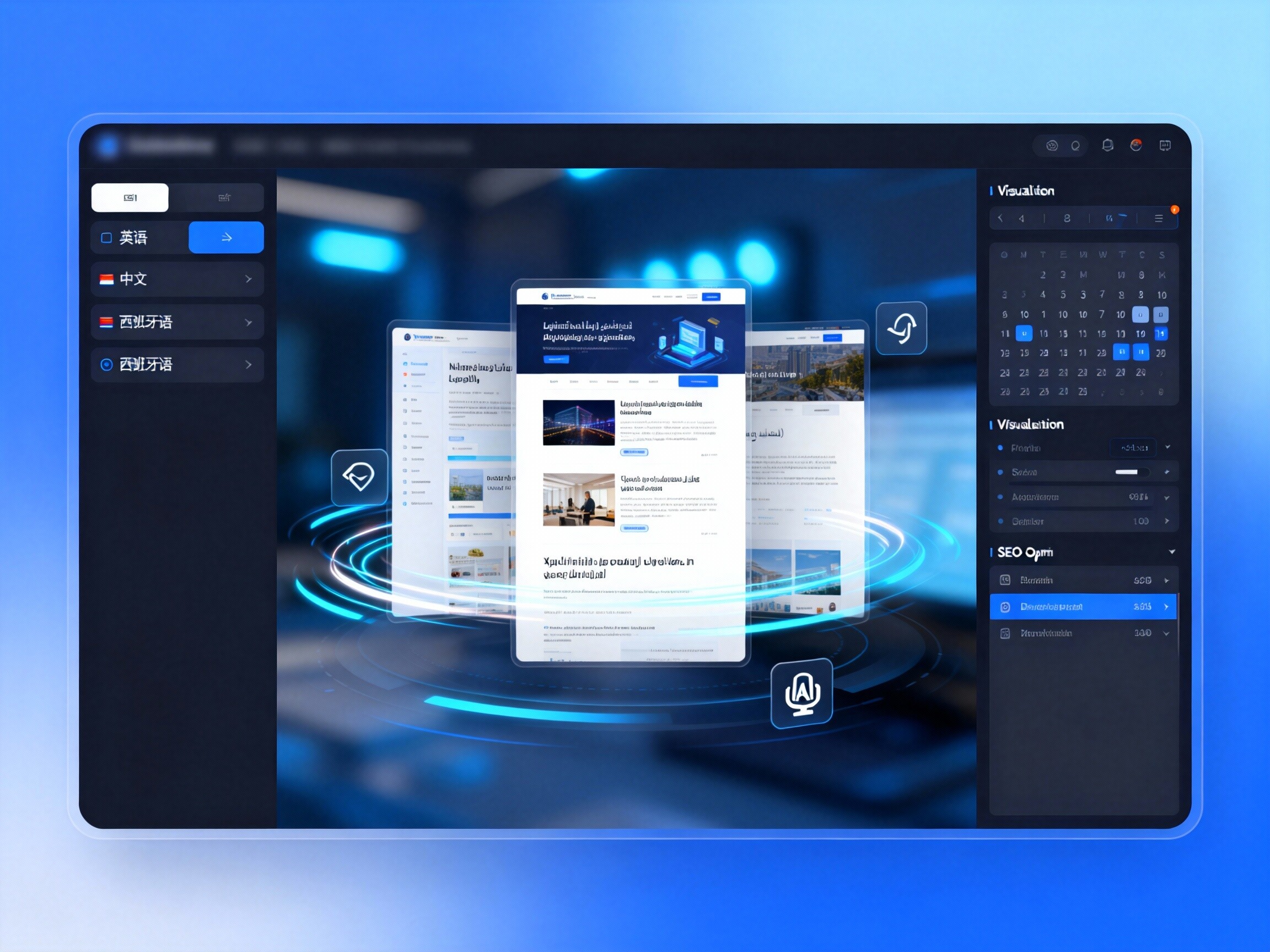Multilingual Website System: An Intelligent Platform to Drive Global Growth for Enterprises
A multilingual website system is a core infrastructure for enterprises to expand into overseas markets and enhance their international brand image. With the acceleration of global trade digitization, businesses need a smart platform capable of rapid construction, automatic multilingual adaptation, multi-region support, and multi-terminal compatibility. Represented by next-generation cross-border marketing tools like EasyGlobal multilingual website system, it leverages capabilities such as automatic translation, multilingual SEO, smart page management, responsive layout, and unified content control to help enterprises effortlessly build international websites, boosting overseas exposure and conversion rates. This topic page will delve into this domain from multiple dimensions including system architecture, technical principles, industry value, functional modules, application scenarios, and certification standards, helping you fully understand the core value and future trends of multilingual website systems.
I. Key Definitions: What is a Multilingual Website System
A multilingual website system is a website-building tool specifically designed for globalized needs, capable of supporting the simultaneous creation, management, and maintenance of multiple language versions of a site. The system enables language switching, content synchronization, multilingual SEO, regional access acceleration, global CDN delivery, and cross-language content structural consistency. Through unified backend management, enterprises no longer need to rebuild websites for each language—one configuration generates multiple versions, significantly reducing costs and operational pressures.
For example, the EasyGlobal multilingual website system utilizes smart translation engines, semantic optimization algorithms, auto-adaptive templates, overseas acceleration nodes, and AI SEO modules to provide enterprises with a one-stop cross-border website solution, helping export-oriented businesses break geographical barriers and enhance international inquiries and brand authority.
II. Development History: The Evolution of Multilingual Website Systems
The development of multilingual website systems can be roughly divided into four stages:
Stage 1: Single-Page Switching Era Early enterprises had to build separate websites for each language, with completely isolated structures, extremely high maintenance costs, difficult content synchronization, and poor SEO performance.
Stage 2: Multilingual Plugin Era CMS platforms (e.g., WordPress) introduced multilingual plugins, allowing language versions to coexist but still suffering from plugin conflicts, inaccurate translations, and formatting issues.
Stage 3: Professional Multilingual Platform Era Dedicated website-building tools emerged, offering unified content management, multilingual templates, and automatic translation, improving maintenance experience but lacking SEO and global acceleration.
Stage 4: Intelligent, Globalized Era (Led by SaaS platforms like EasyGlobal) Leveraging AI translation, global CDN, smart adaptation, multilingual keyword libraries, semantic recognition, and GEO auto-routing, truly achieving global marketing capabilities.
Today, multilingual website systems have evolved from "website builders" to "global growth tools," becoming core marketing infrastructures for cross-border enterprises.
III. Technical Principles: How Multilingual Website Systems Work

The multilingual content management capability of these systems relies on several core technical principles:
1. Language Version Database Model: The system uses content index IDs to uniformly manage all language versions, ensuring structural consistency, style synchronization, and one-time updates across different languages.
2. AI Semantic Translation Engine: NLP semantic understanding enables industry-specific vocabulary adaptation, automatic polishing, and multilingual content optimization for more professional and natural translations.
3. Multilingual URL Architecture: Auto-generates SEO tags like hreflang and canonical, supporting country/language combinations (e.g., /en/, /zh-cn/, /de/, /fr/) to ensure smooth indexing of all language versions.
4. Global CDN Acceleration: Overseas nodes ensure faster access to local language versions for global visitors, improving user experience and conversion rates.
5. GEO Smart Recognition: Automatically recommends the most suitable language version based on visitor IP and language preferences, enhancing access efficiency.
6. Responsive Layout Technology: Auto-adapts to different screens and text lengths, avoiding layout issues caused by translations.
IV. Technical Features of Multilingual Website Systems (Using EasyGlobal as Example)
The EasyGlobal multilingual website system offers the following key technical features:
1. Auto-Translation with Human Proofreading Supports AI translation, professional terminology libraries, and manual proofreading modes for higher content accuracy.
2. Multilingual SEO Optimization Module · Auto-generates multilingual meta tags · Multilingual sitemaps · Global keyword libraries · Auto-injected hreflang tags Enhances search engine rankings across countries.
3. Smart Content Synchronization After modifying Chinese content, the system prompts synchronization to all language versions, avoiding inconsistencies.
4. Self-Adapting Templates Templates auto-adjust for different language text lengths (e.g., German, Arabic, Russian).
5. Global Server Acceleration Built-in overseas CDN nodes in the US, Europe, Southeast Asia, and the Middle East.
6. Content Security & Stability Cloud-based SaaS architecture eliminates self-maintenance, with real-time website backups.
V. Applications and Scenarios

Multilingual website systems can be applied to various cross-border businesses, including:
1. Export Enterprises Multilingual product pages, brand pages, and news pages to boost overseas inquiries.
2. Industrial Manufacturing Display product specs, applications, and technical documents more professionally.
3. Cross-Border E-commerce Multilingual product descriptions, payment pages, and logistics info.
4. Global Franchise Expansion Localized language versions for different markets to enhance brand credibility.
5. Education & Training Show course info and enrollment processes for international students.
6. Tech SaaS Companies Display product features, documentation, user guides, and industry solutions.
VI. Comparative Analysis: Traditional Websites vs Multilingual Systems vs EasyGlobal
1. Traditional Websites: · Separate maintenance per language · High cost and time-consuming · Weak SEO · No global CDN
2. Basic Multilingual Systems: · Basic multilingual functionality · Limited translation quality · No dedicated overseas optimization modules · Incomplete template adaptation
3. EasyGlobal Multilingual System: · Fully automated multilingual management · AI semantic translation · Multilingual SEO modules · Global acceleration · GEO auto-language recommendation · SaaS model, no maintenance · More suitable for long-term use by export enterprises
VII. Industry Scenarios: Why All Sectors Need Multilingual Systems
Export manufacturing, machinery equipment, electronics, software SaaS, education, cross-border trade, and medical devices strongly require multilingual support because:
· Overseas clients trust native-language content more · Brand internationalization needs official multilingual websites · Google SEO relies on clear multilingual structures · Information transparency determines inquiry quality
VIII. Certifications: Standards for Excellent Multilingual Systems
1. Multilingual HTML standards
2. International SEO standards (Google/Bing/Yandex) · hreflang · canonical · Multilingual sitemaps
3. CDN global acceleration security standards
4. GDPR data protection requirements
5. WCAG accessibility guidelines
The EasyGlobal multilingual system complies with these standards, providing enterprises with more stable globalization infrastructure.
IX. EasyGlobal Multilingual System Functional Modules (Key Features)
1. Multilingual Content Management Center 2. Auto-Translation & Terminology Library 3. Multilingual SEO Hub 4. Global CDN Acceleration 5. GEO Language Auto-Recognition 6. Responsive Page Layout 7. Multilingual Image Replacement 8. Language-Specific Permission Management 9. Template Auto-Adaptation 10. Product Library Multilingual Management
FAQ
Q: Can multilingual website systems auto-translate? A: Yes, EasyGlobal supports AI translation and professional terminology matching for higher international expressiveness.
Q: Do multilingual websites help with Google SEO? A: Significantly—built-in hreflang and multilingual sitemaps make all language versions easier to index.
Q: Can websites auto-recommend languages to visitors? A: Supports GEO auto-detection and recommendation of optimal language versions.
Q: Do I need to maintain servers? A: No—EasyGlobal is a SaaS platform with auto-updates, maintenance, and backups.

Customer Reviews
Client A
Our company targets the European market. EasyGlobal's multilingual system helped us quickly launch 8 language versions, significantly increasing inquiries.
Client B
Previously, multilingual setups were very troublesome. Now, one update synchronizes all languages, greatly reducing operational costs.
![How to Improve Conversion Rate in 3 Steps with a Foreign Trade Marketing System? Practical Case Study Revealed How to Improve Conversion Rate in 3 Steps with a Foreign Trade Marketing System? Practical Case Study Revealed]() How to Improve Conversion Rate in 3 Steps with a Foreign Trade Marketing System? Practical Case Study RevealedHow to Improve Conversion Rate in 3 Steps with a Foreign Trade Marketing System? Eyingbao SaaS Platform Combines Responsive Website System with Multilingual Website System, Revealing AI-Driven Cross-Border Website Platform Success Cases to Help Enterprises Expand Overseas Efficiently.
How to Improve Conversion Rate in 3 Steps with a Foreign Trade Marketing System? Practical Case Study RevealedHow to Improve Conversion Rate in 3 Steps with a Foreign Trade Marketing System? Eyingbao SaaS Platform Combines Responsive Website System with Multilingual Website System, Revealing AI-Driven Cross-Border Website Platform Success Cases to Help Enterprises Expand Overseas Efficiently.![How to create a multilingual website for Latin America? 3 steps to quickly enter the Mexican market How to create a multilingual website for Latin America? 3 steps to quickly enter the Mexican market]() How to create a multilingual website for Latin America? 3 steps to quickly enter the Mexican marketUtilize Eyingbao SaaS platform's multilingual website system and AI-driven foreign trade marketing system to swiftly build a responsive multilingual website for Latin America, precisely target the Mexican market, achieve localized SEO optimization and global traffic acquisition, helping businesses expand overseas efficiently.
How to create a multilingual website for Latin America? 3 steps to quickly enter the Mexican marketUtilize Eyingbao SaaS platform's multilingual website system and AI-driven foreign trade marketing system to swiftly build a responsive multilingual website for Latin America, precisely target the Mexican market, achieve localized SEO optimization and global traffic acquisition, helping businesses expand overseas efficiently.![How to Improve Conversion Rate in 3 Steps with a Foreign Trade Marketing System? Practical Case Study Revealed How to Improve Conversion Rate in 3 Steps with a Foreign Trade Marketing System? Practical Case Study Revealed]() How to Improve Conversion Rate in 3 Steps with a Foreign Trade Marketing System? Practical Case Study RevealedHow to Improve Conversion Rate in 3 Steps with a Foreign Trade Marketing System? Eyingbao SaaS Platform Combines Responsive Website System with Multilingual Website System, Revealing AI-Driven Cross-Border Website Platform Success Cases to Help Enterprises Expand Overseas Efficiently.
How to Improve Conversion Rate in 3 Steps with a Foreign Trade Marketing System? Practical Case Study RevealedHow to Improve Conversion Rate in 3 Steps with a Foreign Trade Marketing System? Eyingbao SaaS Platform Combines Responsive Website System with Multilingual Website System, Revealing AI-Driven Cross-Border Website Platform Success Cases to Help Enterprises Expand Overseas Efficiently.![AI diagnosis for foreign trade independent station ads, uncovering 80% wasteful ad spend AI diagnosis for foreign trade independent station ads, uncovering 80% wasteful ad spend]() AI diagnosis for foreign trade independent station ads, uncovering 80% wasteful ad spendEasyYbao AI-driven foreign trade independent station system achieves AI ad diagnosis and multilingual website construction synergy, precisely reducing 80% ad spend waste, helping businesses efficiently expand into Middle Eastern, Latin American, and global markets.
AI diagnosis for foreign trade independent station ads, uncovering 80% wasteful ad spendEasyYbao AI-driven foreign trade independent station system achieves AI ad diagnosis and multilingual website construction synergy, precisely reducing 80% ad spend waste, helping businesses efficiently expand into Middle Eastern, Latin American, and global markets.![How to choose a multilingual website system? Key indicators for foreign trade enterprises to determine suitability in 5 minutes How to choose a multilingual website system? Key indicators for foreign trade enterprises to determine suitability in 5 minutes]() How to choose a multilingual website system? Key indicators for foreign trade enterprises to determine suitability in 5 minutesHow to choose a multilingual website system? This guide helps foreign trade website system and multilingual foreign trade website system decision-makers evaluate compatibility within 5 minutes through loading speed, SEO, URL/hreflang, automated TDK generation, data analysis tools, and integration capabilities with foreign trade marketing systems, social media marketing, and competitive ranking. It introduces global website SaaS platform selection points and EasyStore landing solutions, covering AI translation, localized editing, one-stop domain resolution, SSL/CDN/DDoS protection, and trial verification to accelerate independent site operations and reduce costs. Apply now for a free technical consultation.
How to choose a multilingual website system? Key indicators for foreign trade enterprises to determine suitability in 5 minutesHow to choose a multilingual website system? This guide helps foreign trade website system and multilingual foreign trade website system decision-makers evaluate compatibility within 5 minutes through loading speed, SEO, URL/hreflang, automated TDK generation, data analysis tools, and integration capabilities with foreign trade marketing systems, social media marketing, and competitive ranking. It introduces global website SaaS platform selection points and EasyStore landing solutions, covering AI translation, localized editing, one-stop domain resolution, SSL/CDN/DDoS protection, and trial verification to accelerate independent site operations and reduce costs. Apply now for a free technical consultation.![B2B Foreign Trade Marketing Website Construction Must-See: 3 Key Designs to Boost Inquiry Volume B2B Foreign Trade Marketing Website Construction Must-See: 3 Key Designs to Boost Inquiry Volume]() B2B Foreign Trade Marketing Website Construction Must-See: 3 Key Designs to Boost Inquiry VolumeRevealing the 3 Key Designs of B2B Foreign Trade Marketing Website Construction: Breaking Language Barriers with Multilingual Website Architecture, AI Marketing Plugins Increase Inquiry Conversion Rate by 200%, Responsive Self-Service Website Tools Empower Independent Business Operations. A 10-Year Experience Summary of Yibao's Foreign Trade Independent Station Construction Solution Helps You Build High-Conversion Foreign Trade Websites and Quickly Secure Overseas Orders.
B2B Foreign Trade Marketing Website Construction Must-See: 3 Key Designs to Boost Inquiry VolumeRevealing the 3 Key Designs of B2B Foreign Trade Marketing Website Construction: Breaking Language Barriers with Multilingual Website Architecture, AI Marketing Plugins Increase Inquiry Conversion Rate by 200%, Responsive Self-Service Website Tools Empower Independent Business Operations. A 10-Year Experience Summary of Yibao's Foreign Trade Independent Station Construction Solution Helps You Build High-Conversion Foreign Trade Websites and Quickly Secure Overseas Orders.![Why do 90% of B2B foreign trade website projects fail? You might be missing this system Why do 90% of B2B foreign trade website projects fail? You might be missing this system]() Why do 90% of B2B foreign trade website projects fail? You might be missing this systemEyingbao enterprise-grade multilingual CMS, integrating an AI multilingual website system with cross-border foreign trade website solutions, helps reverse 90% of failed projects. With smart SEO, responsive design, and geo-targeted deployment, it makes overseas expansion more efficient.
Why do 90% of B2B foreign trade website projects fail? You might be missing this systemEyingbao enterprise-grade multilingual CMS, integrating an AI multilingual website system with cross-border foreign trade website solutions, helps reverse 90% of failed projects. With smart SEO, responsive design, and geo-targeted deployment, it makes overseas expansion more efficient.![Use Eyingbao to build a cross-border e-commerce website, with real cases of doubling traffic in the first month Use Eyingbao to build a cross-border e-commerce website, with real cases of doubling traffic in the first month]() Use Eyingbao to build a cross-border e-commerce website, with real cases of doubling traffic in the first monthEyingbao enterprise-level multilingual CMS helps build cross-border e-commerce websites, AI-driven geo-targeting and SEO optimization, supports real-time translation in 40+ languages, rapid launch within 72 hours, doubling traffic in the first month, a trusted intelligent website solution for over 100,000 users.
Use Eyingbao to build a cross-border e-commerce website, with real cases of doubling traffic in the first monthEyingbao enterprise-level multilingual CMS helps build cross-border e-commerce websites, AI-driven geo-targeting and SEO optimization, supports real-time translation in 40+ languages, rapid launch within 72 hours, doubling traffic in the first month, a trusted intelligent website solution for over 100,000 users.










